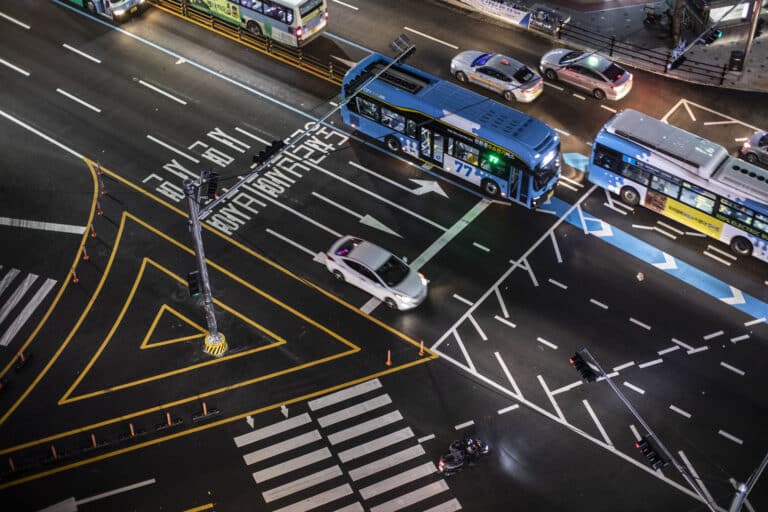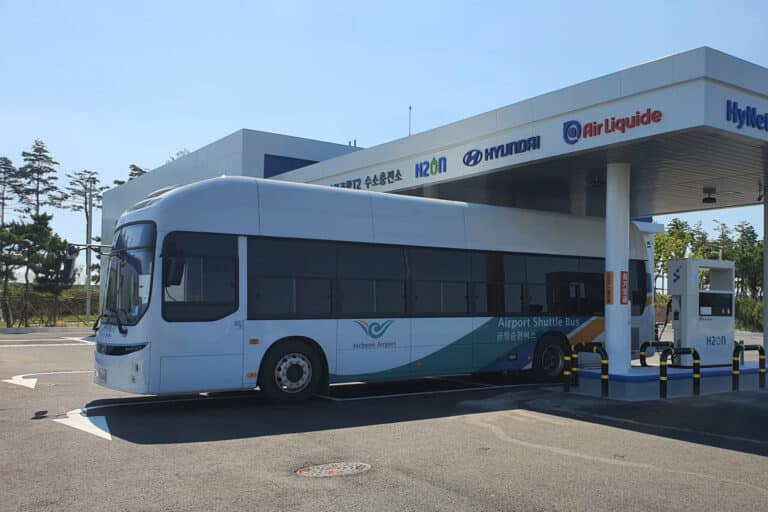According to Korea’s Hydrogen Economy Roadmap, the country aims to produce 6.2 million fuel cell electric vehicles and have rolled out at least 1,200 hydrogen refueling stations by 2040. It also includes plans to ramp up hydrogen buses to 41,000 and outlines an objective to supply 15 GW of fuel cell power generation.
Hydrogen Council founding member Air Liquide is contributing to this ambitious national hydrogen mobility plan. Together with multiple local partners, Air Liquide is developing the sector across the entire value chain: production, storage, distribution, application and several large scale projects.
Developing large scale hydrogen filling centers
Air Liquide is focusing on the heavy duty market development with high pressure filling centers and liquid hydrogen investment to sustain its growth.
In May 2022, Air Liquide and Lotte Chemical entered a joint venture to scale-up the hydrogen supply chain for mobility markets in the country. The companies will co-invest through the joint venture in a new generation of large scale hydrogen filling centers in Daesan and Ulsan, allowing them to serve three of the country’s most densely populated regions, including the Seoul metropolitan area.
Air Liquide and Lotte Chemical also expect multiple synergies and envision the development of several opportunities to foster the rise of the hydrogen economy in Korea. Air Liquide will bring its expertise in design, manufacturing and operation of key hydrogen technologies including for hydrogen conditioning and distribution, and hydrogen refueling stations. Lotte Chemical will bring its access to large quantities of hydrogen, from its own off-gas sources located in Korea’s main industrial basins of Daesan and Ulsan. These sites are strategically located to host the conditioning hubs and refueling stations, and leverage demand in hydrogen for its own fleet of trucks group wide.
Making Incheon International Airport hydrogen ready
In the same spirit, Air Liquide aims to help decarbonize the aviation sector. In February 2022, Air Liquide, Airbus, Korean Air and Incheon International Airport Corporation signed a Memorandum of Understanding to explore the use of hydrogen at Incheon International Airport. More globally, the collaboration will also study the development of a Korean airport infrastructure to support the deployment of hydrogen-powered commercial aircrafts. This partnership reflects a shared ambition to drive the emergence of an innovative aviation sector dedicated to supporting the Korean government’s goal of carbon neutrality by 2050.
In addition, the airport currently counts two high-capacity hydrogen refueling stations that were developed by Air Liquide, which will also supply the molecule under a long-term contract. The goal of Incheon International Airport Corporation is to gradually upgrade its current fleet of shuttle buses with hydrogen buses. A project that also includes Hyundai Motor Company (hydrogen buses) and HyNet (station operator).
Deploying advanced hydrogen station networks
In the downstream market, considering Korea is leading world-wide adoption of hydrogen-powered fuel cell vehicles, alongside Germany, Japan and California, Air Liquide is participating in the HyNet (Hydrogen Network) consortium with 13 companies, with the goal to deploy a nationwide network of hydrogen refueling stations.
In March 2021, Air Liquide entered into another consortium named KOHYGEN to build hydrogen stations for buses and trucks. KOHYGEN targets to build and operate 300 heavy duty hydrogen stations by 2040.
Air Liquide is proud to be part of those key projects that support the development of Korea’s hydrogen economy. In line with its global Sustainable Development Objectives, Air Liquide is committed to continue to invest into and develop hydrogen technologies and solutions that can contribute to a more sustainable future.





